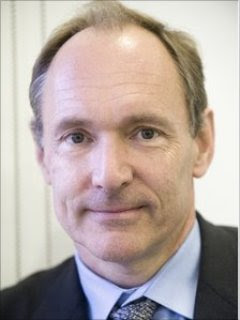The inventor of the Web has called for everyone to have access to his creation for free.
Tim Berners-Lee said that he would like to see everybody given a low-bandwidth connection "by default".
He said the web could be instrumental in giving people access to critical services such as healthcare.
Currently, he said, just one-fifth of the world's population has access to the web.
"What about the other 80%?" he asked the audience at the Nokia World conference in London.
"I would like to see people enrolled in a cheap data plan by default. I would like them to get it for free."
Sir Tim said the rise in mobile networks around the world meant there was now an opportunity to connect everyone.
"What about these people who have a signal but are not part of the web, who are not part of the information society?" he said.
"I initially assumed you should get them water first, you should get them healthcare and then it is the luxury of getting the web," he said.
"But it is not actually like that. The web can be pretty instrumental in getting them access to healthcare."
He said that the resulting healthcare would be different to that experienced in western countries but would offer a step change in many regions of the world that had none.
"There is no Aids vaccine, so what are you going to do about it?" he asked.
"Getting that message across in their own tongue on the web is something that isn't happening now."
He said access to the web could allow people to "create their own communities and share their own information" about health, agriculture and business.
"Not being a part of the information society is a really important thing."
He said that he even a low-bandwidth connection offered for free via a mobile phone could make a difference.
At the moment, he said, connections were too expensive and were often taxed by governments.
He suggested that network providers could offer the free connections on the basis that people would become more affluent in the future and would then be wiling to pay for more expensive, higher-bandwidth mobile services.
"They will move up when they can," he said.
He admitted that when he first created the web, it would have been "hubris" to suggest that everyone had access to it. But, he said, there were now compelling arguments its benefits.
"I would like everyone to think about it," he said.
His comments about the value of universal access to communications and the web echo those of the head of the International Telecommunications Union, the UN body that oversees telecoms.
Dr Hamadoun Toure, secretary general of the body, recently told BBC News that access to information should be a "universal human right".
However, their views are at odds with many development agencies, which agree that the web can help accelerate development, but believe critical services such access to fresh water water should be a priority.
Tier fears
Sir Tim also used his speech to outline his stance on other concerns he has about the future of the including privacy and net neutrality, the principle that ensures that all web traffic is treated equally regardless of the type or origin.
"We assume that when you look up a [web page], that you can get any page because that is the way it has always been and that is why the web has flourished," he said.
"Of course a lot of companies would like to limit the pages you get."
For example, he said, a firm that sells streaming movies may "like to slow down access to other people's movies".
He said some governments also threatened the principle.
The issue has recently been the focus of intense debate, particularly in the US, where some network providers advocate "tiered" services in which certain traffic can be given priority over the net.
They argue at the rise in web traffic, particularly for bandwidth intensive services such as web video, has placed an expensive burden on their networks.
The discussions recently prompted Google and Verizon to publish a plan that would ensure the principles are upheld on fixed-line broadband but take a much lighter approach to the mobile net, where bandwidth is tight and data management issues are more acute.
"The moment you let that net neutrality go, think what you lose: you lose the web as it is, that you can click on a link and go anywhere."
Source: BBC


Comments
Post a Comment